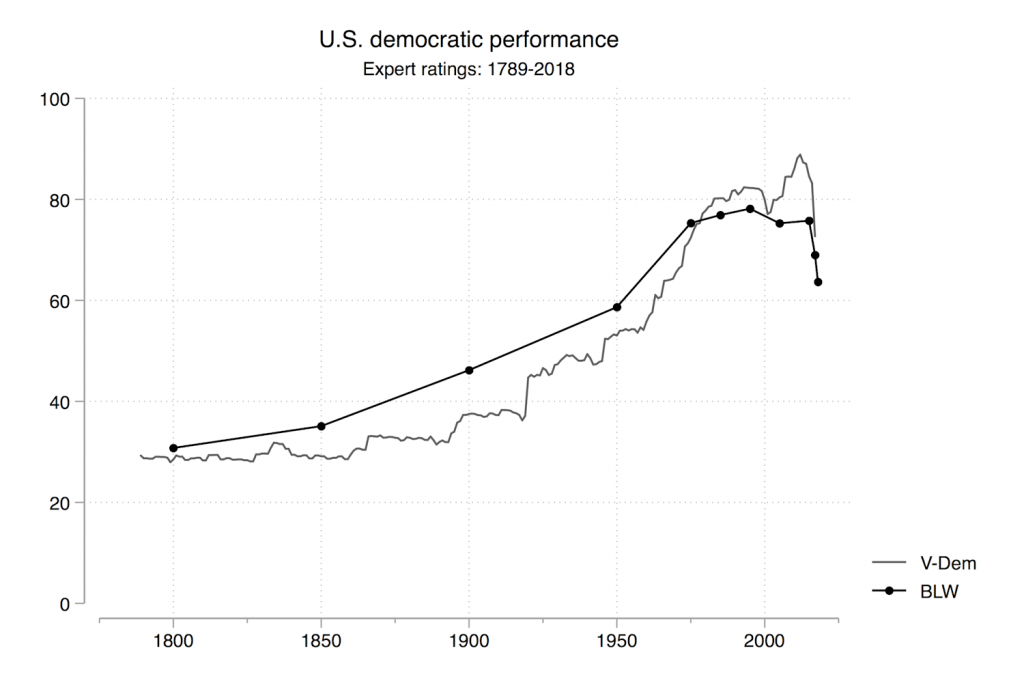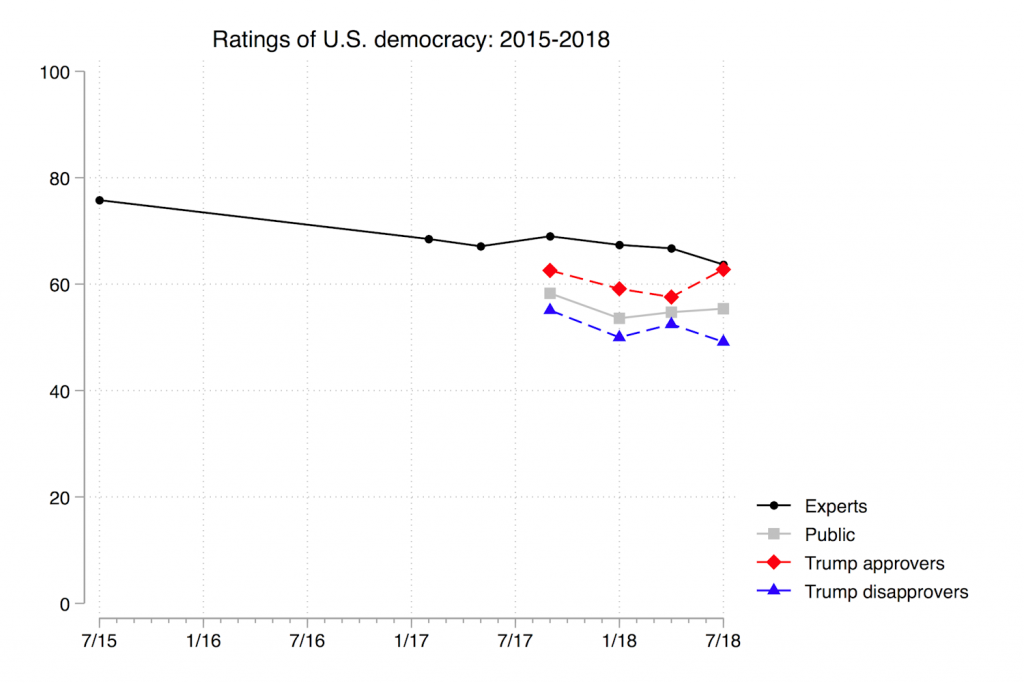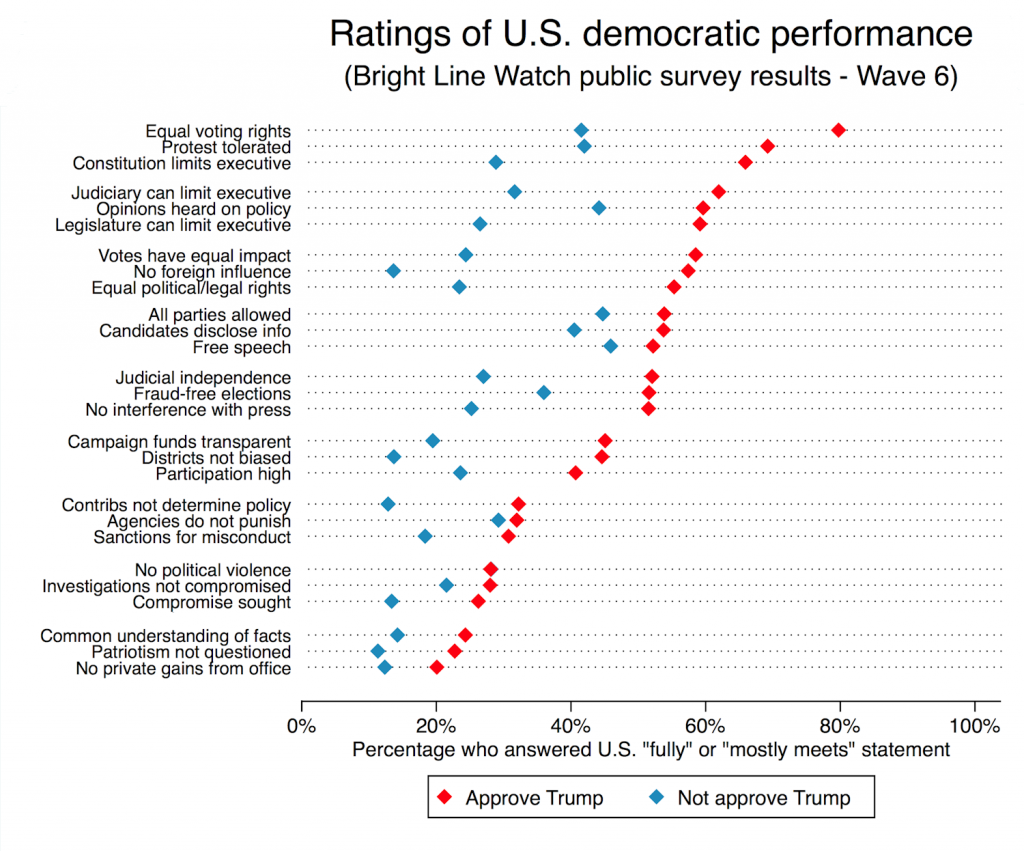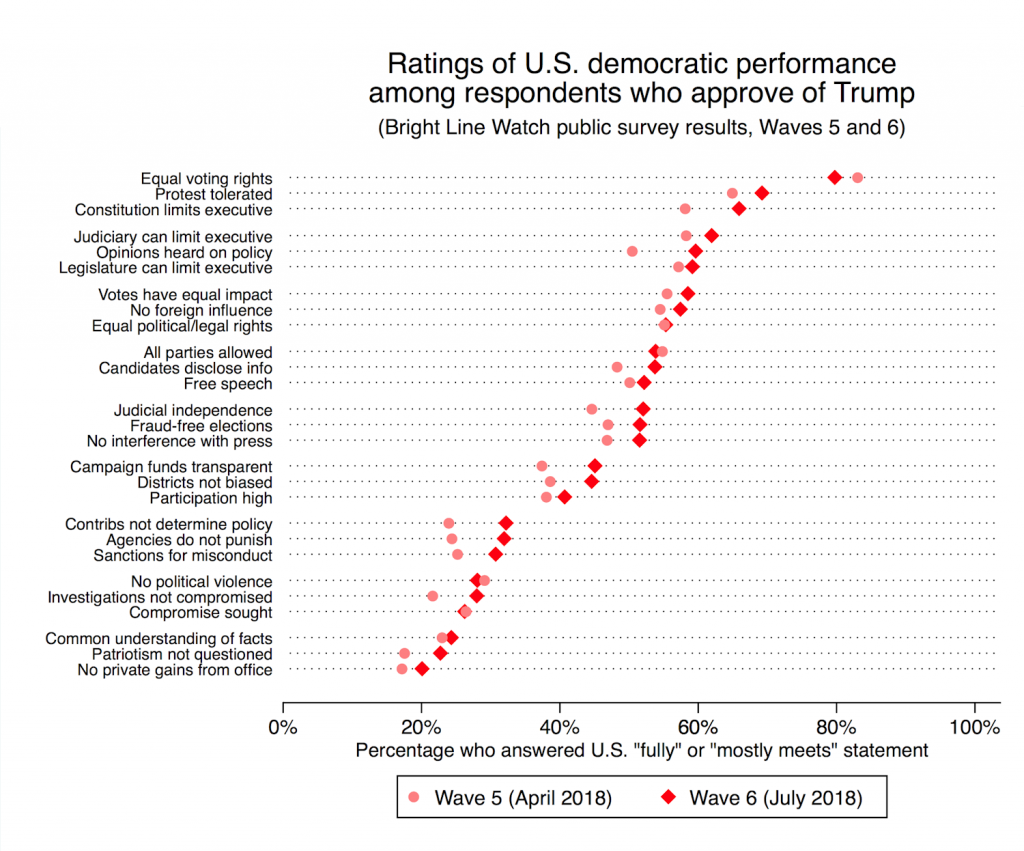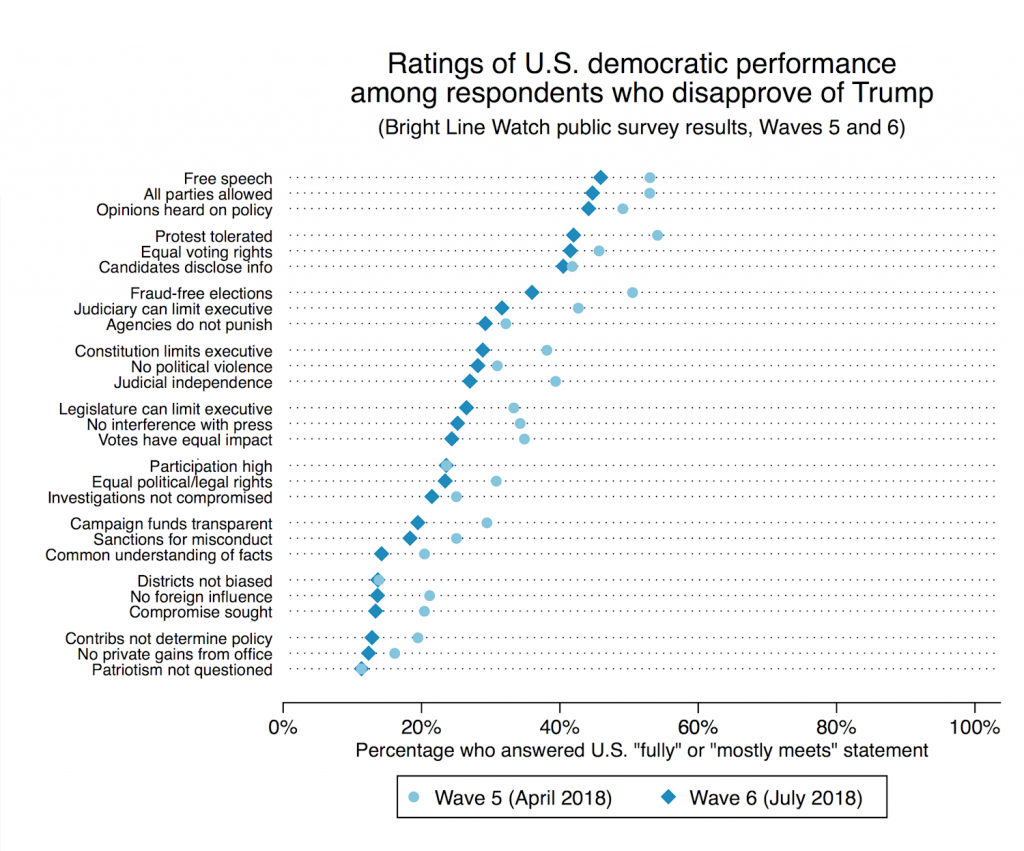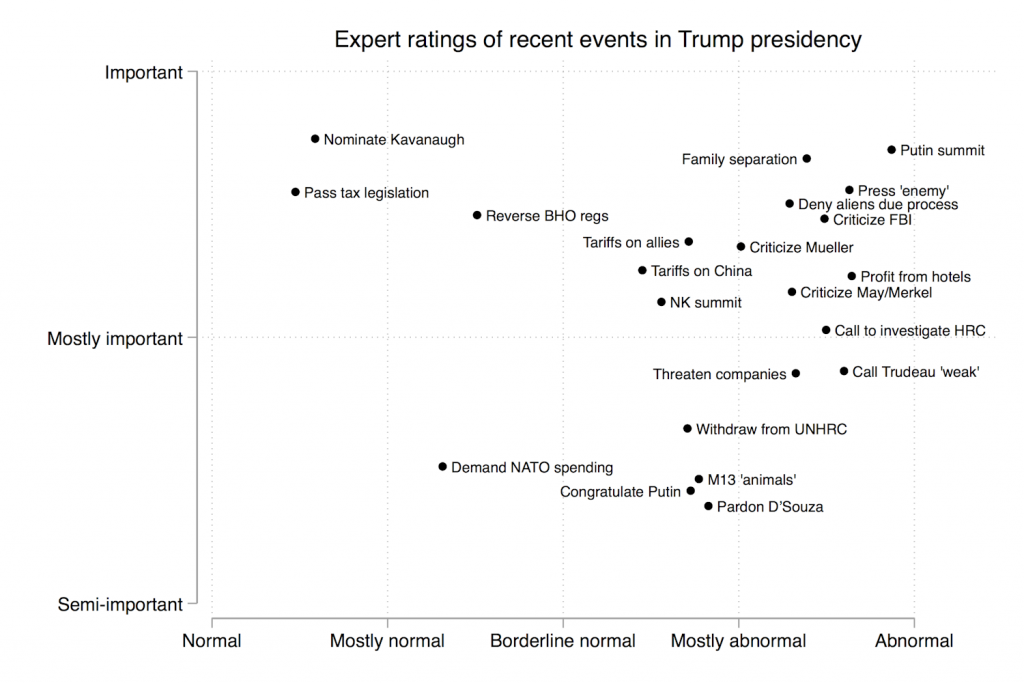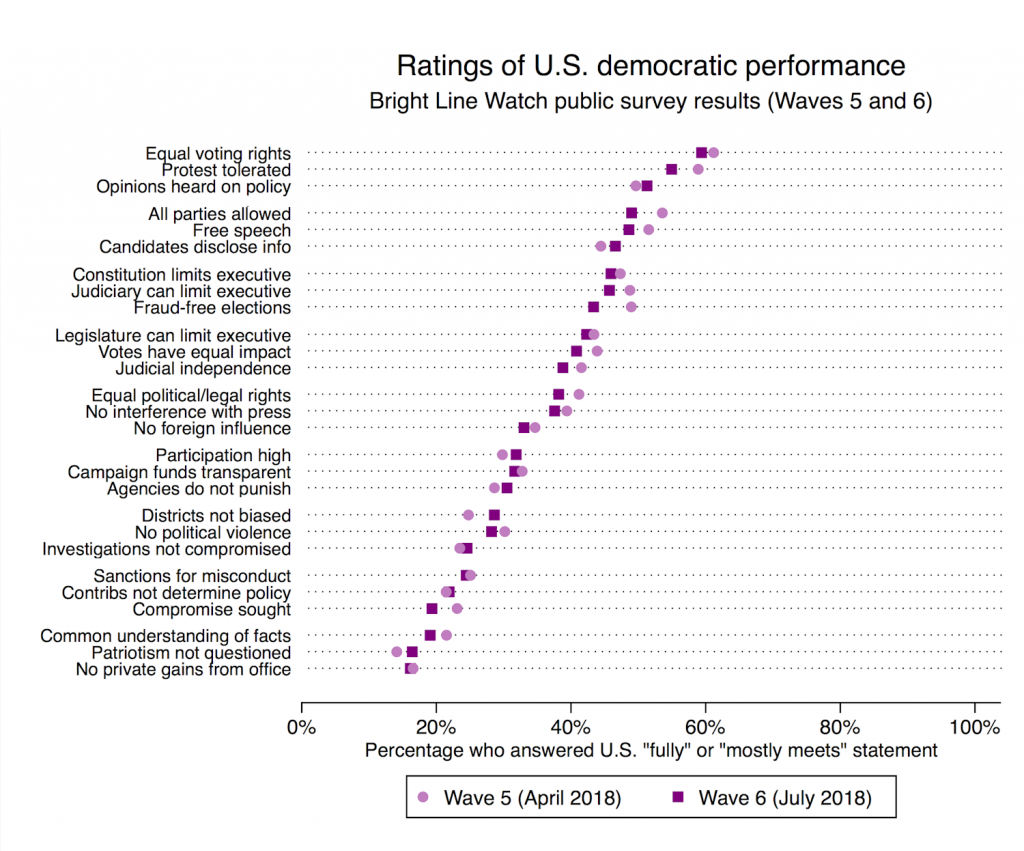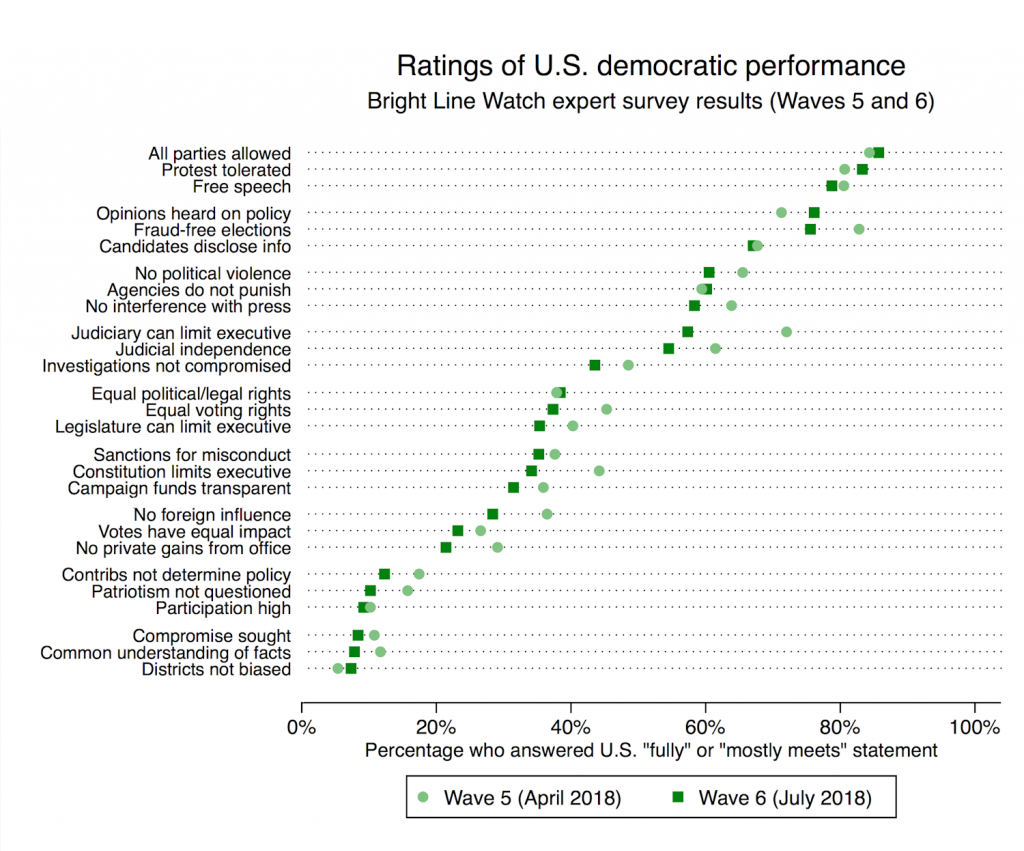Erosion, polarization, and norm violations:
Bright Line Watch Survey Report
August 1, 2018
Donald Trump is a disruptor. Few would disagree that his actions and style of political combat set him apart from past presidents. There is less consensus about the implications of Trump’s distinctive governing style for the health of American democracy, however.
To understand how Americans rate their democracy in the Trump era, Bright Line Watch (BLW) conducted its sixth expert survey, and its fourth public survey in July 2018. These consisted of an expert sample of 679 political science faculty at American universities (surveyed July 7–23) and a nationally representative sample of 2,000 adults (surveyed July 11–18). Respondents in both surveys assessed the degree to which 27 democratic principles (listed in an appendix to this report) are currently upheld in the United States and evaluated the overall quality of American democracy on a 100-point scale. Participants in our expert sample also rated a set of 22 statements describing recent political events on two separate scales — how normal/abnormal they are in the context of U.S. politics, and how important/unimportant they are. The second battery, on (ab)normality and (un)importance, is based on similar surveys conducted by the New York Times Upshot blog in February and May 2017.[1]
The key results from this survey are sobering:
-
American democracy is continuing to erode. Our expert respondents perceive a consistent, ongoing decline in the overall quality of American democracy from 2015 (assessed retrospectively) to our first expert survey in February 2017 and over the five subsequent surveys we have conducted since then.
-
Public ratings of the quality of American democracy are continuing to polarize. Notably, those who disapprove of Trump report ongoing democratic erosion. However, those who approve of the president perceive the quality of democracy to have improved measurably during this period.
-
Across a range of measures, President Trump’s supporters and his detractors are drawing conclusions about democracy that are not merely disconnected, but are often antithetical to each other.
-
A number of recent political events are characterized by experts as both highly abnormal and important.
Erosion in the quality of American democracy
We start by summarizing expert evaluations of the overall quality of American democracy throughout U.S. history and during the Trump era. Our May 2017 survey asked the expert sample to rate the quality of U.S. democracy currently and retrospectively at nine historical dates: 1800, 1850, 1900, 1950, 1975, 1985, 1995, 2005, and 2015. We have asked for the same rating in each of our six expert surveys (February, May, and September 2017; January, April, and July 2018).
In the figure below, the black line with dots shows the average ratings from the Bright Line Watch expert sample for each historical date plus the May 2017 and July 2018 ratings. It is measured on a 0–100 scale. For comparison, the grey line shows the Liberal Democracy Index from the Varieties of Democracy Project (V‑Dem), rescaled to the same 0–100 scale, which extends back to the ratification of the Constitution in 1789.[2]
The trajectories sketched by V‑Dem and by the Bright Line Watch experts are remarkably consistent over time, though the BLW assessments are a bit more tempered (slightly higher than V‑Dem from the mid-19th century to the mid-20th, slightly lower since). Notably, both indices drop sharply in the last few years of the series. V‑Dem’s data end in 2017 but BLW experts perceive further decline in 2018 (from 76 in 2015 to 69 in 2017 to 64 now). We interpret this plunge as the response to the events of the 2016 U.S. presidential election and the Trump presidency.[3]
We next turn to a comparison between experts and the public. The next figure illustrates changes in perceptions of American democracy since 2015. In addition to presenting ratings from our academic experts and a from representative sample of Americans, it also breaks out the latter group into those who specifically approve and disapprove of President Trump.
Comparing the BLW expert sample with the public overall, we see that the experts rate American democracy higher than the public on average in each survey[4], but that both experts and the public perceive a continued erosion in democratic quality over the past year. From September 2017 (the first survey for which we have both public and expert data) to July 2018, the average scores decline from 69 to 64 for the experts, and from 58 to 55 among the public.
However, this overall decline also masks growing polarization within the public between Trump approvers and disapprovers. Trump approvers have rated U.S. democracy higher than disapprovers in each of our public surveys, but the ratings previously tended to move roughly in parallel. In the most recent survey, however, we see a sharp divergence. The democracy rating among Trump supporters increased from 58 to 63 while the rating among Trump opponents declined from 53 to 49, widening the gap from 5 to 14 percentage points (its previous high was 9 percentage points in January).
The two figures presented above paint a troubling picture. The overarching pattern of progress achieved over the last two centuries is now reversing. The decline of 2016 has continued throughout the first eighteen months of the Trump presidency according to the assessments of both experts and the public (on average). We also observe increasing polarization between Trump’s supporters and his opponents over the status of democracy in America.
Unpacking performance and polarization: 27 democratic principles
In addition to assessing the overall quality of democracy, our expert and public survey respondents rated performance on 27 distinct democratic principles.[5] Our main metric of performance here is the percentage of respondents who rated the United States as “fully” or “mostly” meeting a given democratic standard, as opposed to the percentage saying the United States only “partially meets” or “does not meet” it.[6]
The figure below shows the percentage of Trump supporters and opponents who rate the U.S. as fully or mostly meeting the standard proposed by each statement of principle (e.g., “Government does not interfere with journalists or news organizations”). Statements are listed in descending order of performance as assessed by those who approve of the president. The principles listed higher in the graph tend to be those on which opinions diverge the most between pro- and anti-Trump respondents — on whether equal rights are guaranteed to all citizens, on the effectiveness of institutional checks on executive authority, and on the fairness of elections. On these matters, those who disapprove of Trump rate American democracy poorly whereas the president’s supporters give our system high marks.
The largest gap we observe is for the question asking whether U.S. elections are free from foreign influence — 57% of Trump supporters, but only 14% of opponents, say the U.S. fully or mostly meets the standard. These numbers did not differ significantly by whether respondents were surveyed before or after President Trump’s Helsinki summit with Vladimir Putin, which took place while the survey was in the field.
On other items, the divide between Trump supporters and opponents is less stark, in part because both groups see performance as lacking. Two principles that stand out as examples are that government agencies do not punish political opponents (32% of supporters and 29% of opponents say the U.S. meets the standard “fully” or “mostly”) and that investigations into official misconduct are not compromised (28% for supporters, 22% for opponents). Rather than signaling a harmonious bipartisan consensus, however, similar ratings on these principles might indicate that both sides see the other as responsible for undermining democratic practices. In criticizing the FBI, Special Counsel Robert Mueller, and prominent intelligence officials, President Trump claims he is under siege by a supposed “deep state.” By contrast, Trump critics might regard the president’s attacks as compromising the independence of agencies and investigations. We discuss this issue further in the next section of this report.
As in prior surveys, both Trump supporters and opponents give low ratings to principles that reflect norms of civility in political behavior: recognizing the legitimacy of political adversaries, seeking compromise, and finding a common understanding of facts. Finally, both groups rate the use of public office for private gain as an area of poor democratic performance.
We have documented the divide in assessments of U.S. democracy between supporters and opponents of the president in previous reports.[7] Here, we drill deeper into the growing divergence by examining the extent to which it is reflected across our 27 principles. The next two figures show performance assessments, first by Trump supporters and then by opponents, on each item over our two most recent surveys (April and July 2018). The items are listed in declining order of each group’s ratings on the most recent survey, which are indicated by the darker markers in each graph. The noteworthy pattern is that the president’s supporters rate democratic performance higher in July than in April on 23 of 27 items (four percentage points higher on average). Among Trump opponents, by contrast, the pattern is completely reversed, with declines on 25 of 27 items from April to July (by six percentage points on average). As a result, overall public ratings are largely stable; see the figure in the appendix.
The uniformity across items of the shifts within each group is as striking as the polarization across groups. Those who disapprove of President Trump regard American democracy as declining on virtually all fronts, and steeply on many. Those who approve of the president regard democratic standards as improving nearly across the board. The disjuncture is more pronounced now than in previous surveys. Just six months ago, we reported on the changes in ratings on the same 27 principles between our September 2017 and January 2018 surveys. At that time, both groups shared similar perceptions of democratic decline. On 22 of the 27 principles, there was no statistically discernible difference between groups in the change over time. By contrast, we now see a significantly greater relative decrease in perceived performance among the president’s opponents on 14 of 27 items when comparing April and July 2018.
In summary, President Trump’s supporters and his detractors are experiencing the same events during his time in the White House and drawing conclusions about democracy that are increasingly opposed.
Speech and policy: What’s (ab)normal, what’s important
Critics and supporters of Donald Trump alike highlight the degree to which the president is unconstrained by convention. To measure the importance of President Trump’s norm violations, our expert survey included an additional battery of questions asking respondents to assess a series of recent political events on their importance and on the degree to which they fit with normal political practice.[8] The list included the following 22 items:[9]
-
President Trump holding a face-to-face summit with North Korean leader Kim Jong-Un
-
President Trump describing members of the MS-13 gang as “animals”
-
The Department of Homeland Security separating children from parents who enter the United States illegally
-
President Trump criticizing Canadian Prime Minister Justin Trudeau as “dishonest and weak”
-
Congress passing tax legislation
-
President Trump pardoning Dinesh D’Souza for making illegal campaign contributions
-
President Trump repeatedly calling the press an “enemy of the people”
-
The Trump administration reversing Obama-era environmental and financial regulations
-
President Trump calling for suspending due process rights for suspected illegal immigrants
-
President Trump profiting from political fundraisers and events held by foreign dignitaries at hotels and resorts owned by his family business
-
President Trump calling for the Department of Justice to investigate Hillary Clinton
-
President Trump publicly criticizing the investigation led by special counsel Robert Mueller
-
President Trump nominating Brett Kavanaugh to replace Supreme Court Justice Anthony Kennedy
-
The United States withdrawing from the United Nations Human Rights Council
-
President Trump congratulating Vladimir Putin on his election victory
-
President Trump demanding greater defense spending from NATO allies
-
President Trump threatening American businesses such as Amazon and Harley-Davidson
-
The Trump Administration imposing tariffs on $34 billion in Chinese imports
-
The Trump administration imposing tariffs on steel and aluminum from Canada, Mexico, and the E.U.
-
President Trump publicly criticizing the F.B.I.
-
President Trump questioning the conclusions of U.S. intelligence about allegations of Russian election meddling during a press conference alongside Russian President Vladimir Putin.
-
President Trump publicly criticizing the leaders of the United Kingdom and Germany at a time when both are politically vulnerable at home.
Each respondent was asked to rate eight items (before the Helsinki summit) or nine items (afterward) that were randomly selected from the list above on two separate five-point scales according to the following instructions:
-
Normal or Abnormal, where 1 is business as usual for a presidential administration, like vetoing a bill or appointing a cabinet, and 5 is highly unusual for American democracy, like Iran-Contra or ordering newspapers to halt the publication of the Pentagon Papers.
-
Unimportant or Important, where 1 has limited or no consequences for the federal government, like the first family’s pets or the menu for a state dinner, and 5 creates a significant or lasting change, like the establishment of Social Security or the Voting Rights Act.
The following figure illustrates the distribution of statements across these two dimensions. The markers indicate the mean value of expert responses on each 5‑point scale. The items are more dispersed across the normal-versus-abnormal scale (on the horizontal axis) than on importance (the vertical axis), where all 22 items were rated above the midpoint (“semi-important”) of the scale.[10] Two of the events that were rated as most important — the nomination of Brett Kavanaugh to the Supreme Court and Congress’s overhaul of the tax system — are also regarded as relatively normal. To only a slightly lesser degree, the same is true for the Trump’s efforts to reverse Obama administration regulations on the environment and the financial sector. The consequences of these policies are substantial, but both are consistent with standard practice under recent administrations. Experts also rated Trump’s demand that NATO allies increase their defense spending as less consequential but still normal. Presidents of both parties have pushed NATO partners in the same direction (albeit typically more discreetly).
Of the 22 events we selected, 18 are rated on the abnormal side of the scale (above the midpoint of “borderline normal”). We start with those items rated on average between “borderline normal” and “moderately abnormal,” which include a number of events that range from relatively high to relatively low on the importance scale. Our experts regarded Trump’s pardon of Dinesh D’Souza as only semi-important, notwithstanding speculation that the move establishes a precedent for the arbitrary use of the pardon power for political allies in the future. They similarly discounted the importance of Trump’s reference to MS-13 gang members as “animals” and his phone call to congratulate Russian President Vladimir Putin on victory in a tainted election despite substantial outcries about both events at the time. And they regarded the United States’s withdrawal in June from the United Nations Human Rights Commission as less than momentous, perhaps because of the body’s mixed record for influence and the checkered human rights records of many members.
Other items in this range of abnormality were regarded as more consequential. President Trump’s summit with North Korean leader Kim Jong Un, despite the lack of concrete policy agreements, falls in this category. So, too, do two more substantive policy actions that Trump was able to execute unilaterally — imposing tariffs on a range of Chinese goods, and on steel and aluminum imports from U.S. allies including Canada, Mexico, and the European Union.
On the right-hand side of the figure are the most dramatic departures from normal politics — those rated as on average between “mostly abnormal” to “abnormal” by our experts. The most crowded sector of the figure is at the upper right where items rated high on both abnormality and importance are clustered. The highest combined rating here goes to President Trump’s statements in Helsinki, where he sided with Russian President Vladimir Putin and against American intelligence agencies on whether Russia interfered with the U.S. election in 2016.
Strikingly, most of the items that stand out as both important and abnormal, like the Putin press conference, are not substantive policy actions but rather verbal attacks by President Trump on political adversaries. The president’s repeated characterizations of the press as an “enemy of the people” score high on both scales, as do his criticisms of the FBI, of the Mueller investigation, and of British Prime Minister, Theresa May, and German Chancellor, Angela Merkel. In a similar category would be his calls (so far empty) for criminal investigations into his former political opponent, Hillary Clinton, and to suspend due process for those suspected of entering the country illegally.
Slightly lower in importance, but still rated as abnormal, are President Trump’s criticism of Canadian Premier Justin Trudeau as “dishonest and weak” and his threats (again, empty so far) to use regulatory power to punish private sector actors such as Harley-Davidson for considering moving production overseas, or Amazon.com for the critical reporting by The Washington Post, which is owned by Amazon CEO Jeff Bezos.
The right-hand side of the figure is not entirely without substantive policy content. Most important here is the separation of families entering the United States illegally at the southwest border. Separating thousands of children from their parents, many of whom have not been reunited, triggered widespread protests, legal challenges, and even public rebuke from some nationally prominent Republicans before the Trump administration eventually walked back from the policy. Also in this sector is the ongoing practice by the president and his family of profiting from patronage at Trump properties by political actors and foreign dignitaries, which our experts as important and abnormal.
These exceptional cases aside, however, the events that our experts rate as most abnormal and important are overwhelmingly speech acts that are unconnected to any formal presidential authority or public policy (as in prior Upshot surveys in February and May 2017). President Trump’s practice of airing criticisms and threats publicly and preemptively contributes to the sense that these speech acts are not normal. But because they lack policy substance, one might reasonably question the importance our experts attribute to them.
The case for their importance depends on whether Trump’s speech is eventually translated into policy or influences the behavior of other actors, including Congress, the federal bureaucracy, and future presidents. In some cases, Trump’s extreme rhetoric might expand the range of what policy options are considered reasonable or deter political opposition. Of most direct concern to Bright Line Watch, however, are speech acts that encourage the violation of essential democratic practices. When the president calls for the criminal investigation of a political opponent, suspending an investigation of an ally (or of the president himself), or denying to a whole category of people due process explicitly granted in the Constitution, the implications are ominous even if policy changes do not follow immediately. If presidential speech in these areas eventually changes how other political actors understand the scope of constitutional protections or the boundaries around the political use of government authority, then President Trump’s transgressive speech could represent an existential threat to American democracy. That is why, we suspect, experts regard these speech acts as both highly important and highly abnormal.
Appendix: Changes in ratings of U.S. democratic performance, public sample
Appendix: Ratings of ratings of U.S. democratic performance, expert sample
Appendix: Survey method and data
Bright Line Watch surveys on the state of America’s democracy, July 2018
From July 7–23, 2018, Bright Line Watch conducted its sixth survey on the state of democracy in the United States. We conducted previous surveys in February (Wave 1), May (Wave 2), and September (Wave 3) of 2017, and in January (Wave 4) and April (Wave 5) of 2018. Waves 1 and 2 targeted expert respondents only. Waves 3–6 have paired the expert survey with a representative survey of the American public. Details on the Wave 6 survey are provided below:
-
Expert: On July 7, we sent email invitations to 9,195 political science faculty at universities in the United States. By July 23, after two reminder emails, we had complete responses from 679 (a response rate of 7.4%).
-
Public: YouGov fielded the public survey from July 11–18, producing 2,000 complete responses.
Both the expert and public samples in Wave 6 responded to a battery of questions about democratic performance in the United States. Afterward, they were asked to evaluate the quality of American democracy overall on a 100-point scale. Expert respondents were then asked to respond to a second battery in which they were presented with a series of statements about current political events and asked to rate them on normalcy and importance. The specifics of each battery are described below. The data from both the expert and public surveys are available here. All analyses of the public data from YouGov incorporate survey weights.
Performance battery
The foundation of Bright Line Watch’s surveys is a list of 27 statements expressing a range of democratic principles. Democracy is a multidimensional concept. Our goal is to provide a detailed set of measures of democratic values and of the quality of American democracy. We are also interested in the resilience of democracy and the nature of potential threats it faces. Based on the experiences of other countries that have experienced democratic setbacks, we recognize that democratic erosion is not necessarily an across-the-board phenomenon. Some facets of democracy may be undermined first while others remain intact, at least initially. The range of principles that we measure allows us to focus attention on variation in specific institutions and practices that, in combination, shape the overall performance of our democracy.
Bright Line Watch’s Wave 1 survey included 19 statements of democratic principles. Based on feedback from respondents and consultation with colleagues, we expanded that list to 29 statements in Wave 2. We then reduced that set to what we intend to be a stable set of 27 statements for the Wave 3 through Wave 6 surveys. 17 of those 27 statements were included in Wave 1, and all 27 were included in Wave 2.
The full set of statements is presented below and grouped thematically for clarity. In the surveys, the principles were not categorized or labeled. Each respondent was shown a randomly selected subset of nine statements and asked to first rate the importance of those statements and then rate the performance of the United States on those dimensions.
27 statements of democratic principles
Elections
-
Elections are conducted, ballots counted, and winners determined without pervasive fraud or manipulation
-
Citizens have access to information about candidates that is relevant to how they would govern
-
The geographic boundaries of electoral districts do not systematically advantage any particular political party
-
Information about the sources of campaign funding is available to the public
-
Public policy is not determined by large campaign contributions
-
Elections are free from foreign influence
Voting
-
All adult citizens have equal opportunity to vote
-
All votes have equal impact on election outcomes
-
Voter participation in elections is generally high
Rights
-
All adult citizens enjoy the same legal and political rights
-
Parties and candidates are not barred due to their political beliefs and ideologies
-
Government protects individuals’ right to engage in unpopular speech or expression
-
Government protects individuals’ right to engage in peaceful protest
-
Citizens can make their opinions heard in open debate about policies that are under consideration
Protections
-
Government does not interfere with journalists or news organizations
-
Government effectively prevents private actors from engaging in politically-motivated violence or intimidation
-
Government agencies are not used to monitor, attack, or punish political opponents
Accountability
-
Government officials are legally sanctioned for misconduct
-
Government officials do not use public office for private gain
-
Law enforcement investigations of public officials or their associates are free from political influence or interference
Institutions
-
Executive authority cannot be expanded beyond constitutional limits
-
The legislature is able to effectively limit executive power
-
The judiciary is able to effectively limit executive power
-
The elected branches respect judicial independence
Discourse
-
Even when there are disagreements about ideology or policy, political leaders generally share a common understanding of relevant facts
-
Elected officials seek compromise with political opponents
-
Political competition occurs without criticism of opponents’ loyalty or patriotism
The Wave 6 survey consisted of two main parts. In the first, each respondent was asked, “How well do the following statements describe the United States as of today?” Each respondent was then presented with 14 statements of principle, randomly drawn from the set above, and offered the following response options:
-
The U.S. does not meet this standard
-
The U.S. partly meets this standard
-
The U.S. mostly meets this standard
-
The U.S. fully meets this standard
-
Not sure
The order in which statements were presented in each battery was randomized for each respondent so there should be no priming or ordering effects in how they were assessed.
After completing the battery on U.S. performance, we asked respondents to rate the overall quality of democracy in the United States today on a scale from 0 to 100, where 0 is least democratic and 100 is most democratic.
Notes
[1] Bright Line Watch collaborated with The Upshot (where BLW’s Brendan Nyhan is a contributor) in designing the original questions and constructing the sample of respondents and consulted with The Upshot before fielding the current battery. Special thanks to The Upshot’s Claire Cain Miller.
[2] V‑Dem is a scholarly consortium that evaluates the quality of democracy around the world and over time using consistent methods and standards to aggregate the opinions of experts in 170 countries.
[3] For more discussion of the retrospective assessments and how they correspond to developments in American political development, see the report from the BLW May 2017 survey.
[4] We suspect that the overall higher ratings among experts are driven primarily by their greater familiarity with politics in countries outside the United States, where democracy and basic rights and liberties are often compromised. For more discussion, see the report from the BLW September 2017 survey.
[5] Each respondent rated 14 principles randomly selected from the full set of 27. The complete list of statements is presented in an appendix to this report. In the survey, respondents rated performance on the individual principles prior to being asked to provide an overall rating on the 100-point scale.
[6] We omit a discussion of changes in expert ratings on the 27 principles in this report due to their general stability. A figure showing these changes is in an appendix.
[7] We direct interested readers in particular to this summary of the first year of BLW surveys.
[8] As noted above, the design of this survey is modeled on previous surveys conducted by The Upshot at the New York Times.
[9] The initial list included just the first 20 statements. Shortly after the survey went into the field, President Trump traveled to Europe to attend a meeting of chief executives from NATO member countries in Brussels, visit the United Kingdom, and take part in a summit with Russian President Vladimir Putin in Helsinki, Finland. The president made a number of controversial statements during this trip. As a result, we added the last two statements to the battery while the survey was in the field.
[10] The figure therefore truncates the unimportant-to important scale at its midpoint to allow greater resolution in the upper section of the scale.

